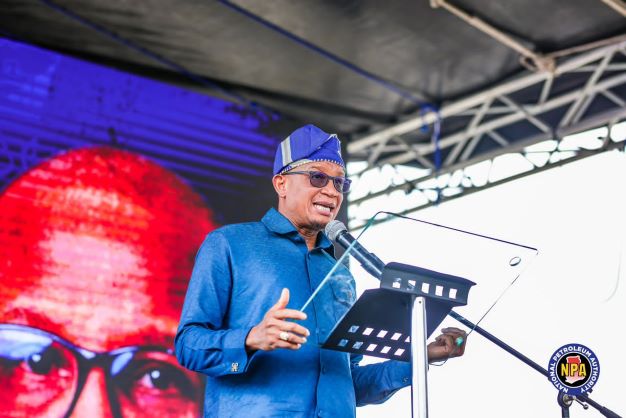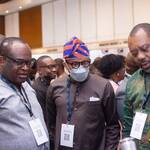The Chief Executive Officer (CEO) of the National Petroleum Authority (NPA), Dr. Mustapha Abdul- Hamid, has disclosed that his outfit will seek Cabinet approval for some taxes on Liquefied Petroleum Gas (LPG) to be removed.
This, according to him, will bring down the cost of LPG considerably and will make it available and accessible to Ghanaians, especially the poor.
He stated that the NPA and the Ministry of Energy are working hard to make it easy for Ghanaians to access LPG and increase its usage to 50% by 2030.
Dr. Abdul- Hamid said this at the launch of NPA’s Liquefied Petroleum Gas (LPG) Awareness and Sensitization Campaign to increase the awareness, adoption and usage of LPG in households and other areas of the economy.
He noted that the campaign is to discourage the use of wood fuel (firewood and charcoal) and increase the LPG penetration for domestic, commercial and industrial activities from the current 37% to 50% by 2030.
“We understand that perhaps the majority of the Ghanaian people are poor and most people cannot afford to buy cylinders and gas. So we at NPA in collaboration with our sector ministry are trying very hard to make it easy for people to access LPG”, he said.
He added that it is also to help eradicate energy poverty by ensuring that energy sources like LPG are available, affordable and accessible to Ghanaians.
He called on investors to come and set up bottling plants in the Northern Region to support the operations of the Cylinder Recirculation Module.
He gave the assurance that he would make a case for tax exemptions for some time for investors who would be will be establishing cylinder bottling plants in the north for them to have maximum return on their investments.
He declared that investors who are prepared to put money into building a bottling facility in the Northern Region of Ghana will receive a tax break for a while in order to get the most out of their investments.
The Second Lady, Hajia Samira Bawumia, who launched the Campaign urged the public, especially women to adopt LPG as it is a cleaner, safer, and healthier cooking fuel.
She said the use of firewood and charcoal for cooking also contributes to climate change through emissions of greenhouse gases and black carbon as well as deforestation through the harvesting of wood and sometimes even economic trees like shea tree, and oak tree.
She noted that Ghana, like many other Sub-Saharan African countries, relies heavily on solid biomass fuels for domestic and commercial cooking and heating.
Hajia Samira said that women and children travel long distances to collect fuel in the form of firewood in most rural communities, and indicated that this time-consuming and exhausting task did not offer much time for other productive activities.
The Deputy National Relations Officer at the Ghana Fire Service, DOIII Ackah Desmond during the launch highlighted some safety tips to help avoid the spread of fire in homes.
He demonstrated how important it is to avoid placing heavy objects on the cylinder regulator and ensure that cylinders are not filled to capacity.
According to him, it is crucial that LGP cylinders undergo expert testing every five years and are routinely sent for examination for burns, corrosion, and rust so that a fire prevention devices can be installed.
He added that the cylinder outside should always be protected so that it will be very impossible for any other entity to tamper with it and perhaps start a fire.
He suggested that users keep powerful portable fire extinguishers on hand in their homes and workplaces where LPG cylinders or gas might be needed.
Deputy Minister of Energy, William Owuraku Aidoo, emphasized that it is imperative to start taking steps to provide households with alternate sources
He noted that the use of charcoal cannot entirely be stopped but may be minimized in order to save the ecosystem adding that it calls for a concerted effort to deal with the phenomenon.
“If we fail to do anything today, what environment shall we leave our children in the future?” he wondered.
He noted that the timing of the promotional drive is significant given the current debate about climate change and its environmental and health effects.
He added that unfortunately, LPG uptake in the country is low and stands around 37% which needs to be actively promoted to increase the percentage.
In this vein, he said that the NPA’s Sensitisation and Awareness Campaign is laudable and will be anchored on the implementation of the Cylinder Circulation Module to ensure that at least 50% of Ghanaians have access to safe, clean and environmentally friendly LPG by 2030.
He advised the NPA to do more work to enhance consumer confidence in the use of LPG and improve investor confidence in the industry.
“No effort should be spared to maintain and protect local jobs in the LPG value chain,” he stressed.
He urged Ghanaians to opt for LPG since the continuous use of firewood and charcoal destroys the environment, aside from its effects on their health.
He touted his belief that the LPG campaign will go a long way to promote the use of LPG in the country and achieve the targeted 50% coverage in the sector by 2030.
- Commonwealth lawyers demand reversal of CJ’s suspension - 10 May 2025
- Cedi to resume depreciation in late 2025, S&P warns - 10 May 2025
- Debt restructuring, IMF deal, gold surge propel Ghana to S&P Upgrade - 10 May 2025

